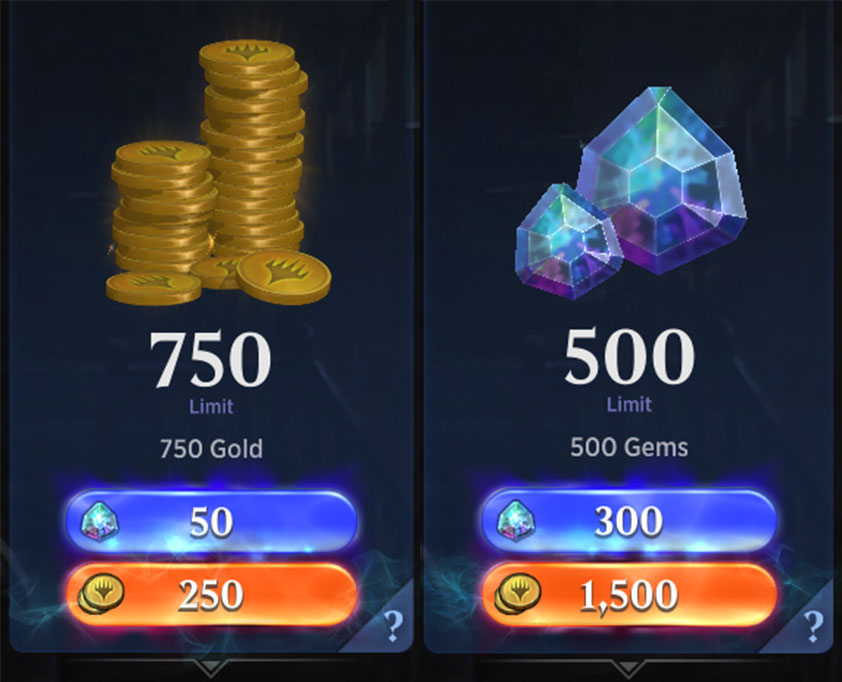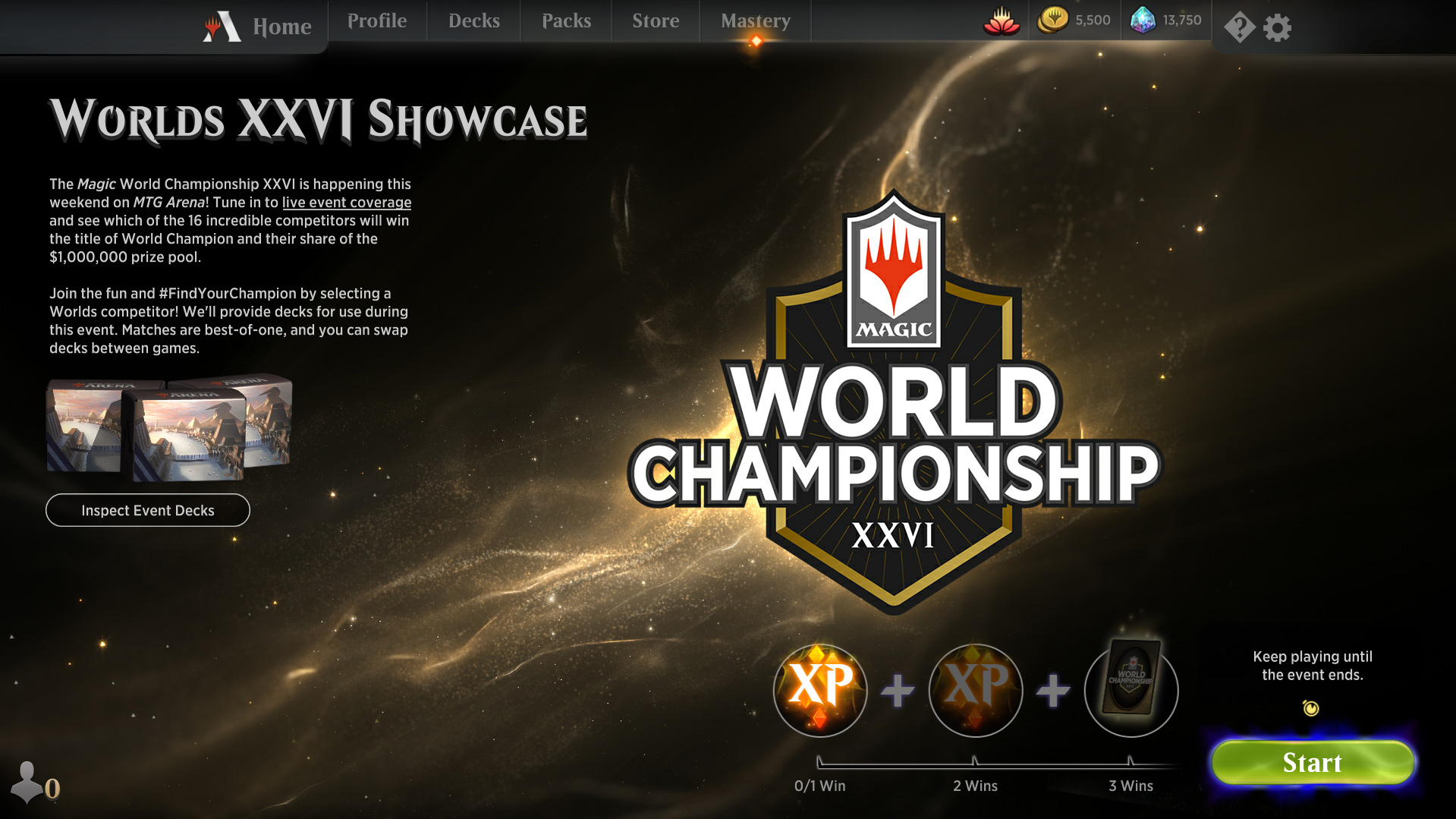I’ve been spending a decent amount of time on MTG Arena since Ikoria launched. While COVID-19 quarantine interfered with my quest to complete my Theros Beyond Death set before the new release, I’ve finally managed to find some stability in my new work-from-home life and have already managed to pack away two Sealed events and a dozen Premier Drafts.
Next week I’ll return to talk about my experience in the first few weeks of Premier Drafting, but right now something else is on my mind: What’s up with all the free stuff?
Free Stuff
Arena has these new-ish Daily Deals which have, up until now, always been discounts on card styles, sleeves, or avatars.

Two daily deals on MTG Arena from the last week.
Over the last few weeks, though, we’ve seen some “free” offers pop up offering the chance to buy 500 gems for 300 gems/1,500 gold or buy 750 gold for 250 gold/50 gems. While you could spend gems to get gems or gold, under no circumstances should you ever do so. If you can spend coins for gems you’re getting premium currency for free currency and that’s a great offer.
I think about free stuff all the time, especially as it pertains to MTG Arena. Cards on Arena are practically free. I say “practically” because we have to look at it from two angles. First, let’s talk about money. From a financial point of view, cards are definitely free. Wizards gives away cards on Arena all the time, and even when they’re not giving them away, packs cost $1.00 each if you choose to pay in cash.
Here’s a quick list of free stuff you get from Wizards:
- Coins via Daily Quests, Daily Wins, and the Season Pass
- Gems via the Season Pass
- Individual Cards via Daily Wins and the Season Pass
- Booster Packs via the Season Pass
- Card Styles and Pets via the Season Pass
That’s not too shabby, and as I’ve written about several times, you can essentially play Magic for free thanks to Arena’s duplicate protection policy. But these new Daily Deals that pop up from time to time seem to take “free” to a new level since literally all you have to do is log into the game and click a few buttons. All of the above items require you to actually play Magic.
But the second way these are “practically” free? You’re paying with your time.
Engagement
Engagement is one of the most important metrics by which companies measure the success of a product. Just yesterday, Hasbro (owner of Wizards of the Coast) CEO Brian Goldner said that they saw a “high level of engagement” with Arena in the first quarter of 2020.
A common way to measure customer engagement with software is a metric called monthly active users (MAU), which can be scoped to weekly or daily increments depending on what you’re trying to measure. An MAU is usually defined as a user that has logged in and completed an action in the last month. Though every company defines the metric differently and we have no insight into how exactly Wizards defines it, these free Daily Deals make it clear clear that Wizards wants you to log into Arena every single day, whether or not you actually play.
As Wizards continues the transition from a primarily paper game to a primarily digital one (in my opinion—see also: adios Planeswalker Points), there will be continued emphasis on logging into Arena every day. Change is scary, but change is good. While it’s sad to see the Pro Tour go away and it’s obviously disappointing to see Planeswalker Points ride off into the sunset, it’s hopefully exciting to see what Wizards has in store for us.
MTG Arena needs to be profitable for Wizards and their parent company Hasbro for obvious reasons. If they’re giving stuff away for free though, how do they remain profitable? Daily or near-daily engagement with Arena is likely the goal Wizards is trying to achieve. The fact that you can only queue up three daily quests at a time, and that there’s a weekly win counter that resets on Sundays are indicators that you’re being actively encouraged to log in regularly, not just when you feel like playing Magic.
Marketing
From a marketing perspective, the free Daily Deals are brilliant. Even if you just log in for five minutes to check out the deals and then go on with the rest of your day, Arena becomes part of your daily routine.
Some of the ways in which Arena drives profit for Wizards are obvious, such as digital card sales, digital currency sales, and cosmetics (card styles, sleeves, pets, and avatars). But some ways are less obvious, such as cross-promoting events like prereleases and coverage of Mythic Championships. In that sense Arena has a dual-purpose as both gaming platform and marketing medium—and with increased engagement comes increased marketing opportunities.

The Worlds XXVI Showcase event was prominently featured on MTG Arena in the lead up to the tournament.
Wizards has a history of finding new ways to market the game to you while you’re already playing it. The advertisement cards that get inserted into packs are a classic example of this technique: you’re a captive audience and you’re already interested in their product, so why not try to get you to buy more of it?
But you don’t open packs of cards every day and you don’t watch tournament coverage every day. Wizards’ marketing team wants to be able to reel you in and message to you every single day (like all good marketers do). Enter Arena and the daily deals of “free stuff.”
Like they say, there is no such thing as a free lunch; Arena is no different. During the game’s first two years, the free stuff came in the form of playing the game itself, which was all well and good since it is likely that you actually enjoy the time you spend playing Magic. But now, there’s a new hidden cost, which is the cost of opening yourself up to a marketing platform.
This is a cost we all pay constantly in our society, whether its through mailboxes (physical and digital) stuffed with advertisements or commercials on television, or banner ads on our favorite Magic content sites. (This article is sponsored by Card Kingdom!) Now, Wizards is tapping into their success with Arena to market more Magic to you, and they want to do it on a daily basis.
That’s not to say this is a bad thing. When the ad tokens went into booster packs, it opened up a whole new source of funding for the game via return on ad spend (ROAS), which is how much customer money is spent as a result of money spent on marketing. Wizards puts X dollars aside for game development and Y dollars aside for marketing costs, which are often separate processes. But when marketing can be in-housed in this way, and combined with existing products, it allows Wizards to essentially invest in themselves. Instead of buying ad space on the internet they can fund feature development on Arena or increase the funding for the MPL by placing ads in their own products—free of charge.
There’s theoretically a point where giving away too much free stuff can devalue your product. I don’t think Arena is anywhere near that point, but it’s likely something Wizards is keeping in mind when they plan their Daily Deal calendar. There’s also a point of overloading your audience with ads that makes your product unusable—as someone who plays a lot of mobile games, there have been plenty of times that I uninstalled a game almost immediately after being inundated with ads.
Arena is, in my opinion, doing a good job of balancing the goals of being a gaming platform and a marketing platform. Hopefully they can continue to grow both aspects in positive ways going forwards. But remember—nothing is really ever free.

